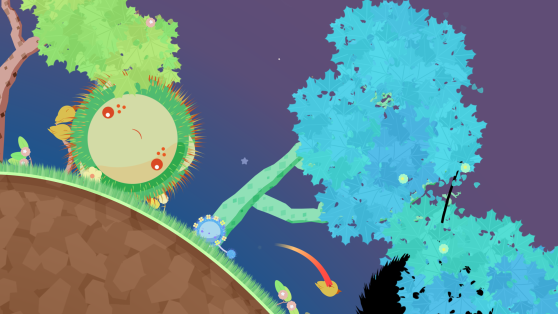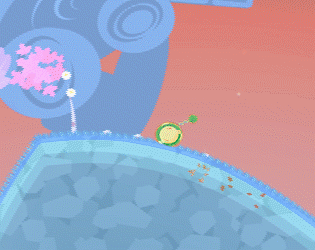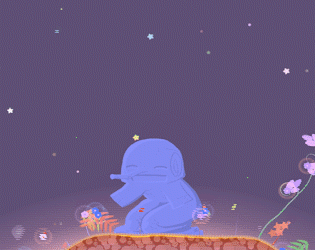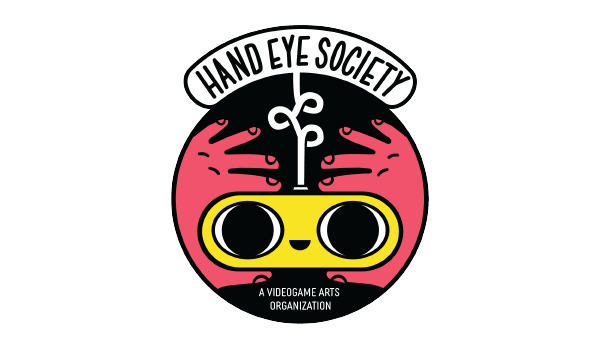
[SPOTLIGHT GAME] SHU’S GARDEN
Every month, Hand Eye members get a free game as part of their soul-damning eternal membership. This week is Shu’s Garden and I’ve written a little ditty on how much I dig the intrepid alien adventurer pinballing around the cosmos. Shu’s Garden is out on Steam, iTunes, Android, and Itch.io.
This essay’s going to be a bit different. The first time I played a version of Shu’s Garden was last spring at Bit Bazaar. Space cactus Shu would tumble across grassy plains, Katamari-style. As you rolled, new plants would sprout behind you. So long as you moved, the world was always growing. I was charmed, so I pitched writing a review to a now defunct arts publication. Then, I sent developers Colin Sanders and Jason RT Bond a few questions and they answered graciously. The review never got published; the answers lay dormant in my inbox.

Source: Shu’s Garden, Itch.io
I stumbled across the answers again while sorting through emails about this game — now finished, with enhancements and on multiple platforms. It’d be a shame if I didn’t use them. However, Shu’s grown (a lot) and I’ve grown (kinda). In keeping with that, here’s a Q&A from Shu’s Garden’s developers with retrospective musing on the side.
What inspired the cute, plant-centric aesthetic of Shu and Shu’s world?
Jason: The gameplay prototype we made years ago at the Toronto Game Jam just lent itself well to the feeling of joy in rolling through grass and bouncing over hills. So when we started on Shu it was with a vague mission to capture this feeling. I think the natural setting was always there because it conjured up thoughts of happiness and freedom. But it became more of a focus when we decided to make a very contained game instead of a wide-roaming adventure: the scope was narrowed, but the world went from being a background to being an active thing. It was at that point that we evolved Shu from a simple expression of happiness and freedom to also being a symbol and champion of the natural world. Thus, today, she’s a space-cactus-ball thing out to restore the planet.
There’s something really cool about a character with incredible power choosing to be gentle. Flowers collect on Shu’s head and seeds spill from her mouth. Then, she’ll swallow an entire tree and jump off the planet.
Shu evokes that “just ‘cause” feeling that would overtake you as a kid, leaving walls covered in toothpaste or pouring a cup of milk over your head. Why not eat that flower? Go ahead, dive deep into the lake and nudge the turtle until it comes ashore. It won’t do anything of value, but you’ll be filled with a sense of accomplishment anyway.
Freedom in Shu emphasizes what mindset you have to be in to play this game. Without goals or easter eggs, roaming is everything. Sometimes, you’ll feel driven to investigate a fallen meteorite or roll around a specific planet. That’s okay. When you’re in play mode, the way you interact transforms. You aren’t compelled to act a certain way to meet quotas. Encounters are purely to see what makes you feel good.
What ruins the experience is searching for purpose; while following a gaggle of yellow birds, do you playfully swat them, to see how they bob in the breeze or do you smack them, in hopes of unlocking an achievement? High scores are artifice. Roll down a hill or something.

Source: Shu’s Garden, itch.io
Did Toronto have any impact on creating Shu’s Garden?
Jason: Knowing that Toronto has a strong indie community influenced my decision to go independent in the first place. But to be honest I’d say the eco-friendly vibes of Shu stand in contrast to city life. I like Toronto a lot, but grew up in the country and have always felt the city culture denies the importance of our natural ecosystems.
Colin: I guess you could say that the impact of Toronto was very influential. For one, Jason and I both live in Toronto and we first met each other several years ago in Toronto. And second, the job market for game designers in Toronto isn’t very strong. There just aren’t that many opportunities. So creating our own game, together, seemed like a very practical choice.
I’m the type of person who feels uneasy in small towns. I love concrete and steel, the crush of crowds, the way streetlights make up for a starless night. At this point in my life, I honestly can’t imagine living without other urban denizens around me.
Shu is one of a handful of creatures thriving in the game. They tend to do their own thing, on whatever planet’s orbit they get pulled into. You could spend entire sessions alone on a planet, where you’d do no harm. Rather, it’s your inaction that causes the only negative consequence of the game: left long enough alone, plants wither and falll. The worlds need you to be present, to explore them and coax newness into their landscapes. You don’t get that kind of responsive acknowledgement of your existence in urban landscapes. In games where players are in built societies, there’s always the sense that everyone and everything will continue to go on, whether you participate or not. The potions seller will keep hawking their wares, the missions will keep being doled out. The opportunities are scarce because demand never ends. Here, when the grass sways and stars streak the horizon, you know your small efforts have kept all of it alive. And there’s entire planets’ worth of space free for you to cultivate.

What are future plans for Shu?
Colin: For Shu’s Garden we plan on releasing at least a couple updates and possibly port it to other platforms. Of course, the success of the game will be the deciding factor as we will need some income to justify the time we put into it from here. If it was a success we would strongly consider making the grander, more adventure-style game. And of course there’d be plushies, t-shirts, candies, TV shows, and a theme park.
Since our interview, Shu’s Garden has definitely gotten the updates Colin wanted. Might not be theme park status yet, but it’s racked up a Kill Screen playlist nomination and was nominated for Canadian Videogame Awards Best Social/Casual Game of 2014.
I’m surprised it hasn’t gotten more acclaim from parents. There are no ads and a privacy statement is available for adults. All the music is soothing, featuring trickling rainsticks and soft human voice-acting (major props to the giraffe’s posh “Oooh” and to the way background music echoes when you’re submerged underwater).
I don’t know what future plans are for Shu’s Garden or for its developers. Funny thing about growth though: it doesn’t stop unless you stop moving. I hope Shu keeps rolling.


